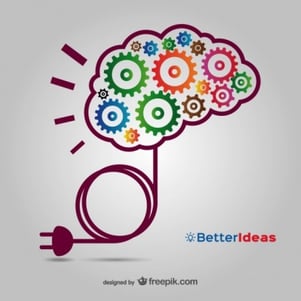The Friday before Halloween was a very sad day indeed.
It was the day that the free trial of my Lumosity app expired. Or at least that’s what my cell phone told me.
Truly, I had a love-hate relationship with that app. Because the games were set up to work on my areas of weakness, some days I did well. Other days, I did not. In any event, I didn’t see the consistent upward trend I both hoped and expected to see, which kind of sucked the fun out of playing the games.
Having reached the age at which I find myself unable to find the correct word or unable to remember why I came into a room much more often than I’d like, I’m an easy target for anything that promises to strengthen the connections in my brain. That said, I tend to choose things I enjoy: Given the choice, I pick word-related over numbers-related, and when I pick numbers related, I prefer manipulation (Sudoku) over calculation (Kakuro).
In other words, I suspect that I choose to strengthen that which is already strong. It’s much more fun that way.
But I’d heard Lumosity advertised by sources I trusted, and I’d heard good things. So when a free trial came my way, I snapped it up. After all, the games were based on research by neuroscientists:
“Lumosity is designed by neuroscientists to train memory, attention, and more. With foundations in the study of neuroplasticity, Lumosity games are used in research, and have been incorporated into studies done by top scientists worldwide.”
That sounded pretty promising, but since I’d just been talking about neuroplasticity with my students, I was a little skeptical. Lumosity.com’s description got the concept right:
“According to this principle of neuroplasticity, the brain is constantly changing in response to various experiences. New behaviors, new learnings, and even environmental changes or physical injuries may all stimulate the brain to create new neural pathways or reorganize existing ones, fundamentally altering how information is processed.” (“The Science Behind Lumosity”)
...but, still, I wasn’t convinced. You know the saying: if something seems too good to be true, it probably is.
It was time to look further, if for no other reason than idle curiosity.
Reading on, I found plenty of good reviews from respected sources: the Harvard Business Review. The Guardian. The Wall Street Journal. Impressive enough.
So I went out in search of negative reviews from equally reliable sources. Bottom line? If you’re playing the games for fun, go for it. If you want to spend the money to continue to access the games, it’s your money to spend.
But if you’re expecting magic and miracles, you may be disappointed. Some of the most optimistic studies have flaws (small sample sizes, data based on self-report), and cognitive psychologists and neuroscientists can’t unequivocally say that the skills transfer beyond the game itself.
In other words, as Tiffany Kaiser said in her “Daily Tech” blog: “I can never tell if I'm actually experiencing any cognitive improvements in the real world or if I'm just familiar with the games, so I know what to expect when playing them.”
I’ve often wondered the same thing. But as long as I enjoy the games and can get them for free (turns out that not subscribing locks me out of some games, while allowing continued access others), I’m going to keep playing. When they stop being fun, there are plenty of other things I can do to take advantage of my brain’s plasticity and strengthen its connections. I can read, take a walk or interact with my family -- and not only are all of those free (cost of the books notwithstanding, but there’s research to support their benefits as well.
For now, Lumosity and other brain-training programs are new enough that the scientific jury is still out; long-term brain changes take time to measure, after all. And the study of neuroplasticity is still in its infancy. We’re learning more about the brain literally every day.
So for now, I’m going to take a middle-of-the road approach. I figure that if eating a variety of foods can make us healthier, it stands to reason that exercising our brains in a variety of ways is probably beneficial as well. And if variety is the spice of life, taking this approach will make my life a little spicier, even if it doesn’t do the same for my memory and attention skills.
Lumosity is optimized for iPhone 5 and requires iOS 7.0 or later. Also available for Android. You can also play Lumosity’s games and find out more about it at lumosity.com. Subscription rates range from $5.00/month to $14.95 a month, depending on the plan you choose.
Want more? Here are two more articles I came across:
Copyright 2014 Lisa Hess
About the Author

Lisa Hess
Transplanted Jersey girl Lisa Lawmaster Hess is the author of a blog compilation, three novels, and three non-fiction books, including the award-winning Know Thyself: The Imperfectionist’s Guide to Sorting Your Stuff. A retired elementary school counselor, Lisa is an adjunct professor of psychology at York College of Pennsylvania. She blogs at The Porch Swing Chronicles, Organizing by STYLE, and here at Catholicmom.com. Read all articles by Lisa Hess.





.png?width=1806&height=731&name=CatholicMom_hcfm_logo1_pos_871c_2728c%20(002).png)
Comments